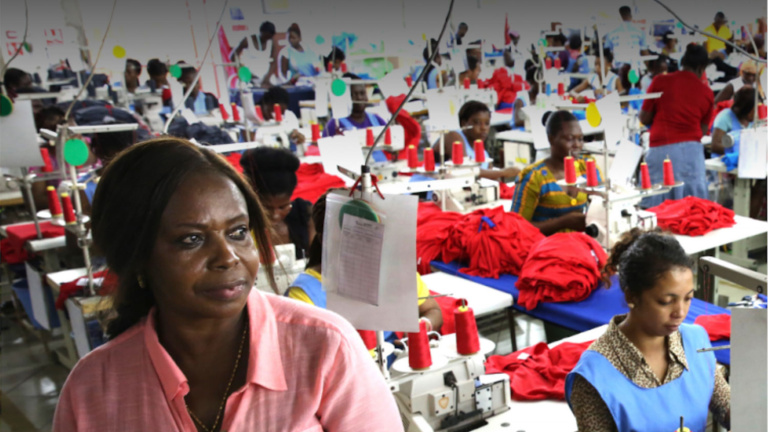
Growing a food company in West Africa: When business means sustainable development
ECDPM’s Fabien Tondel speaks to Sylvie Sagbo, Managing Director of SENAR Les Délices Lysa, a Senegalese manufacturer of food products, and Cécile Carlier, Director of I&P Conseil, the advisory branch of Paris-based Investisseurs & Partenaires, which supports and invests in emerging small and medium-sized enterprises in Africa.
Fabien Tondel: Can you tell us a little bit about SENAR Les Délices Lysa? What’s its business model?
Sylvie Sagbo: We’re a small family-owned company based in Dakar that manufactures peanut-, cashew- and corn-based food products under the brand name SENAR Les Délices Lysa. The company was founded in 1982 by my mother, Lydia Sagbo, who started out by marketing peanuts freshly prepared in a traditional way and gradually expanded the product range. I joined the company upon returning to Senegal in 2015. Up to then, I’d been working in the financial sector in France. We’re now a simplified public limited company operating under the name Lysa & Co. Although I’m officially the company director, I wear many different hats, and my mother, Mamy Sagbo, still helps out.
We’re planning to expand by building a new, higher-capacity production unit outside the city. The plant will comply with international standards and allow us to meet the growing demand for our products. Most of our sales are generated nationally—in Senegalese supermarkets—although we’ve also been seeing rapid growth in direct sales. Exports represent only two to three per cent of our total production.
We owe the strength of our company to the superior taste and authenticity of the products we offer, just as my mother wanted from the beginning when she founded SENAR. And to our spirit of innovation.
Cécile Carlier: The high quality of SENAR’s products and its product innovation and differentiation strategies for giving consumers what they want really make the company stand out. SENAR also successfully manages the risks related to aflatoxin. These are all important factors not only as far as the company’s viability and that of the sector are concerned, but also in terms of the confidence of its investors, like Teranga Capital, the impact investment fund that recently took a stake in Lysa & Co.
How do you manage quality, which is a key factor in your success?
Sylvie: Actually, our manufacturing process results in very low levels of aflatoxin, thus giving us access to international markets. The presence of this mycotoxin, which can be toxic to humans, in peanuts and cashews is a common problem in the industry. We implement a three-stage sorting procedure to minimise risk. The first stage, in which the immature seeds are removed, is overseen by our peanut supplier, whom we’ve worked with for thirty years. We then sort the raw product upon receiving it. Finally, we sort the nuts a third time once they’ve been roasted.
Our method of slow-roasting the nuts in a wood-fired oven allows us to create products of exceptional quality, which are very popular with consumers, such as cashew pralines with sesame, peanut pralines with ginger, cashew nougat with anise and pure cashew butter.
We’ve worked closely with the Food Technology Institute of Senegal to improve our processes. For us, the markets in town are like focus groups where we can try out new products on consumers. We have an established presence at the Dakar Farmers’ Market, a direct sales market promoting artisanal products.
Does social and environmental responsibility influence the way you manage your company?
Sylvie: Yes, in a number of ways. Most importantly, we offer our customers natural, safe, additive-free products produced locally. And we pay just as much attention to our employees. We provide jobs to five salaried employees, including the managing director, and to fifteen day labourers we rely on. Outside management, 80% of our workforce is made up of women. We contribute to their training, as most of them have little formal education, and provide two employees with accommodation. We also indirectly help generate employment through our peanut and cashew kernel suppliers.
We make use of various distribution channels, with a large part of our production being sold via the Auchan chain, which owns twenty supermarkets in Senegal. By establishing a presence in Africa, this brand has chosen to serve not only the middle classes, but also members of poorer communities. Some of our products are sold there in bulk, making them accessible to the less affluent.
How do you strike a balance between the company’s performance and social impact?
Sylvie: Sourcing cashew kernels has become a challenge, given the strong competition in the market from buyers exporting nuts to China, India and Vietnam. When prices began to rise, we sought contract-based solutions in order to better plan and set orders in advance. With support from the NGO International Relief Development, I negotiated a contract with farmers and economic interest groups which collect, shell and peel nuts in Casamance. Monitoring operations has proved difficult, though, as has changing attitudes and practices. In the end, the arrangement just wasn’t meeting our needs. So we went back to buying kernels on the spot market, although we do still plan to gain better control over our supply chains in Senegal and Guinea-Bissau.
Cécile: Ensuring proper procurement of raw agricultural materials is fundamental to impact investment. It contributes to improving impacts and reducing economic, social and environmental risks. We’d like to see links between producers, processors and consumers strengthened to help grow the sectors we invest in. Reliable sourcing is also important in that it facilitates traceability. However, the fact that informality is so widespread in Senegal, as it is in other African countries, doesn’t make this approach an easy one. We often face difficulties when it comes to establishing contracts with producers and helping local agribusinesses secure seasonal operating loans.
What impacts has Lysa & Co. had which you’re most proud of?
Sylvie: We’ve consistently offered quality products and contributed to the local economy. I’m proud our company is now moving into a new phase of development by increasing production capacity.
Cécile: The company markets quality products to Senegalese consumers, while the cashew sector has traditionally been based on the export of unfinished products with some finished products marketed by foreign brands returning to the country and targeting wealthier consumers. So this change is also a great success!
How do you finance your company?
Sylvie: In the past, we financed the business mainly with our own capital and with contributions from the family, although we did take out two small loans to buy a delivery vehicle and a bag-filling machine. But when our production rate started to rise, and given the little capital we had, it became harder to finance the purchase of raw materials. We prefer having a one-year supply of cashew kernels on hand in order to avoid supply disruptions. Banks just aren’t prepared to work with businesses like ours. But since Teranga Capital invested in Lysa & Co. in 2017, our bank manager’s confidence in us has grown, so it’s easier now to obtain an operating loan.
Could you tell us some more about that investment? What factors made it possible?
Cécile: Teranga Capital is an impact investment fund based in Senegal, which is sponsored by Investisseurs & Partenaires (I&P). Teranga has provided Sylvie’s company with debt and equity financing. Sylvie illustrates well the generational shift happening in Africa that allows for new approaches to enterprise development. African entrepreneurs used to be reluctant to borrow or to let an outsider invest in their companies’ capital. Today’s young entrepreneurs are more open to these ideas. I&P has a particular interest in the local agribusiness sector, since it has great economic and social potential, and offers opportunities of developing agricultural and industrial sectors. Finally, an entrepreneur’s personality—especially her or his vision—is key if we’re going to get involved.
Sylvie: Yes, it took some convincing for my mother to agree to take the risk. This investment will enable us to boost our production facilities, develop new products, take on staff and comply with international quality standards. In addition, we’ll be able to give our employees access to complementary health insurance coverage. We’re also planning to implement Ecocert organic certification.

Operating loans seem to be a major challenge…
Cécile: Yes, we at I&P Conseil are well aware of this. We’re currently looking at ways to put tools in place to free up access to operating loans, which are vital for the growth of value chains. In addition, with Teranga Capital having acquired a stake in Lysa & Co., it now belongs to a network of firms and financial services providers offering other sources of support. The company is now in touch with Root Capital, an impact investor focusing on debt financing in rural areas, and with AFRIPAR, a fund that facilitates access to operating loans.
How would you like public policy in Senegal to support you in developing your company sustainably? And regional organisations?
Sylvie: We need more effective sectoral regulatory frameworks, particularly with a view to guaranteeing the supply of cashew kernels for local processing. I’d also welcome more sustained support for exporting to other African countries and internationally. We have products which are ready for export. The Senegalese export promotion agency helped us to present our products at the 2018 Paris International Agricultural Show, but this type of support needs to be longer-term. We’d like to export to Côte d’Ivoire, for instance, but I’m having trouble finding a distributor who is willing to market our products. The West African Economic and Monetary Union should facilitate the trade of local products between West African countries. Finally, I hope the public authorities will start to help the packaging sector develop. Specific retail outlets, such as hotels and petrol stations, require special packaging. Senegalese packaging companies provide services geared towards large volumes and consequently don’t cater for SMEs—and that means we end up having to import, which is costly.
Cécile: As is the case in the rice sector, in which the Senegalese government requires importers to source part of their stocks locally, national and regional policies should be implemented to maximise the potential of local agribusiness sectors. Public policies should support local agricultural producers more effectively, enabling them to join forces, work together and strengthen their role as partners in value chain development. Growing companies like Lysa & Co. also need simplified administrative procedures, better access to energy and regional infrastructure development.
This interview was originally conducted in French, see www.ecdpm.org/great for the original version
Sylvie Sagbo and Cécile Carlier
Read the full magazine issue







